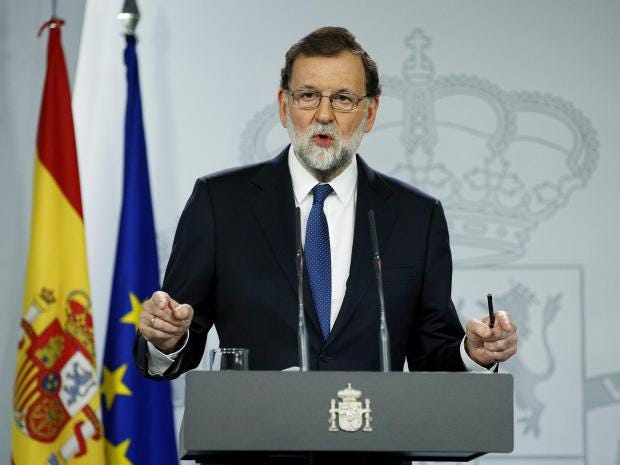
The Spanish government and the Catalonia separatist movement have escalated the their conflict.
Let's briefly recap.
As I previously reported, the Catalonia separatist movement is something rather different than is being reported in most of the press, even fooling some ordinarily astute observers.
Catalonia has always trended to the Left of the rest of Spain. Aside from the leaders of the Catalonia separatist movement like Jordi Pujol and his cronies engaging in massive corruption and money laundering, they also encouraged massive Islamic migration as a solution for Catalonia's low birthrate, and especially, as a tool in their desire for Catalonian independence.
Essentially, they made Mutti Merkel's mistake. They thought that the Muslims would help support Catalonia's welfare state with taxes, and that speaking Catalan and Arabic rather than Spanish, what else would they become but loyal Catalonians?
Of course they forget that the vast majority of Muslima consider themselves members of the Muslim umma first above all, and they failed to look at the rest of Europe to see how resistant many of the new migrants were to any significant assimilation with the host culture. Nor did the Separatists particularly care. As one of their leaders said 'We'd rather be Muslims than Spaniards.'
So this process has continued to the point where the Catalonia separatist movement has made Catalonia the Islamist center of Spain. As you can imagine, the Spanish government is not happy in the least at the idea of having an Islamist friendly state next door. They haven't forgotten the Madrid bombings or any of the other jihad attacks that have occurred in Spain.
Another hidden aspect of this behind the scenes is a covert agreement the Separatist leadership has with the EU to accept an independent Catalonia as a member in exchange for Catalonia accepting a number of Muslim migrants France's Macron and Germany's Merkel want to get rid of from their own countries...migrants Poland, Hungary and other Eastern European members have refused to take under any circumstances. While publicly the EU has voiced sentiments that appear cool to the idea of Catalonian independence for obvious reasons (the last thing they want to encourage is an independent Bavaria, Lombardy, Normandy or Brittany), behind the scenes they support it.
The referendum the Catalonian leaders held on independence attracted at most 40% of the vote if that, chiefly because the Spanish government were quite open to letting the Catalonian government know it was illegal under the Spanish Constitution, warned the Catalonian leadership not to hold it and and sent the paramilitary Guardia to Catalonia to enforce it on Referendum day.
As you can see above the Guardia were quite forceful - well, that's one word for it - in their approach to shutting down the referendum, which gave the Catalonian Separatist movement some talking points in the media. The Catalonian separatists (who counted what votes there were) claim they won the referendum. The Spanish government says an illegal referendum on secession is meaningless.
Spanish Prime Minister Mariano Rajoy, head of Spain's ruling coalition gave the Catalonian government 8 days to either rescind any move towards secession an dbegin talks on settling any differences or to declare independence. He also let them know that if they chose the latter course, he would exercise Article 155 of the Spanish Constitution, which would enable him to dissolve Catalonia’s government and give Spain control of its affairs.
The Catalonian government refused to go one way or the other during that period, in part because it became apparent that that a number of their constituents want to remain part of Spain.
In response PM Rajoy announced yesterday, October 21, that he would invoke Article 155, remove Catalonia's government and its leader Carles Puigdemont and initiate a process of direct rule by the central government in Madrid. Rajoy said that his goal was to arrange new Catalan parliamentary elections within six month and lift the measures taken under Article 155 as soon as possible. Underline that 'as soon as possible' because new elections might not be ready to take place in that time period.
Rajoy took these steps with majority support from Spain’s main political opposition as well as his own ruling party. He'll almost certainly get required approval next week from the Spanish Senate, where his own conservative party holds a majority.
This puts the Catalonia Separatists in a dilemma. If they declare independence at this point, the Spanish government will almost certainly declare martial law and send the Guardia and its military in to enforce it. It also puts Catalonia's police force in the position of either fighting a shooting war against Spain's military or submitting to the Spanish government's control. Since the population of Catalonia itself is obviously divided, that would likely result in a division of the police force, and bloodshed if the pro-separatist police tried to resist the Spanish government forces.
On the other hand, if they simply submit, the Catalonian Separatist movement and its current leadership will lose all credibility among the pro-Separatist constituency in Catalonia.

My personal prediction? Since the Catalonian Separatist leaders will choose none of the above, Spain will send in its military, there will be a few instances of skirmishes and violence and that will be the end of it.
Stay tuned...






No comments:
Post a Comment